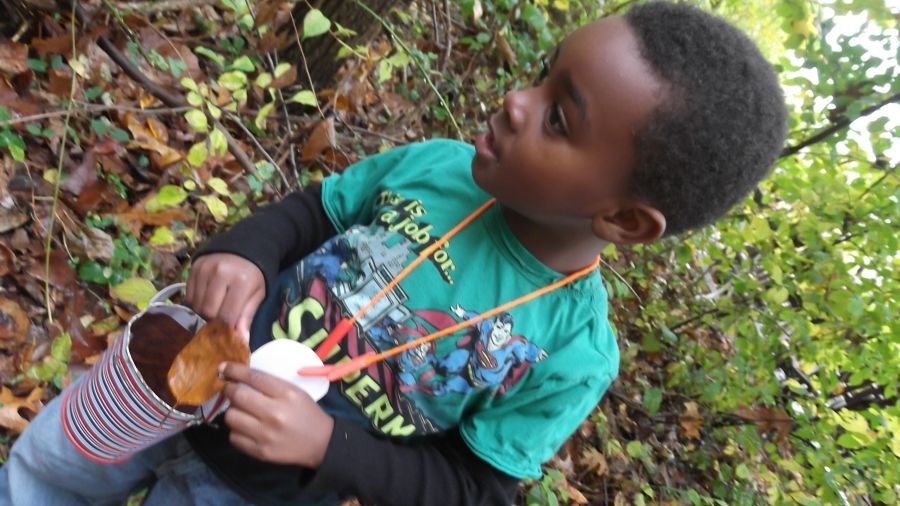
On any given day, a newly homeless young child might hurry along behind a parent who must visit two or three or four different government agencies and social programs, trying to understand paperwork, file for benefits, and get connected with vital services. She might have one or more brothers and sisters along with her, and she will most likely have to negotiate the public transit system to do it, transferring from one bus line to another, crisscrossing the city to keep appointments.
For most children in this situation, it doesn't leave a lot of time for enjoying nature with their parents. But a new partnership between the Irvine Nature Center and the Ark Preschool that serves homeless children in Baltimore, Maryland, aims to give homeless children and their parents a place and time to take a break in nature.
A Lost Population
Every year, an estimated 1.5 million children experience homelessness. Children who grow up in unstable environments are at much higher risk for developmental delays that cause them to lag behind their peers. On average, a family living in a homeless shelter moved four times in the year leading up to their entry into the shelter. This instability takes a toll on young children, and many experience delays in the development of language, and often have emotional and behavioral problems, too. Some of these behavioral problems can be related to their frustration as they struggle to be understood with their limited language skills.
But just when these kids need the most help—when they are falling behind at the most critical time in their development—the system often lets them slip through the cracks. "This is a lost population," explains Nancy Newman, Director of the Ark Preschool in Baltimore, Maryland.
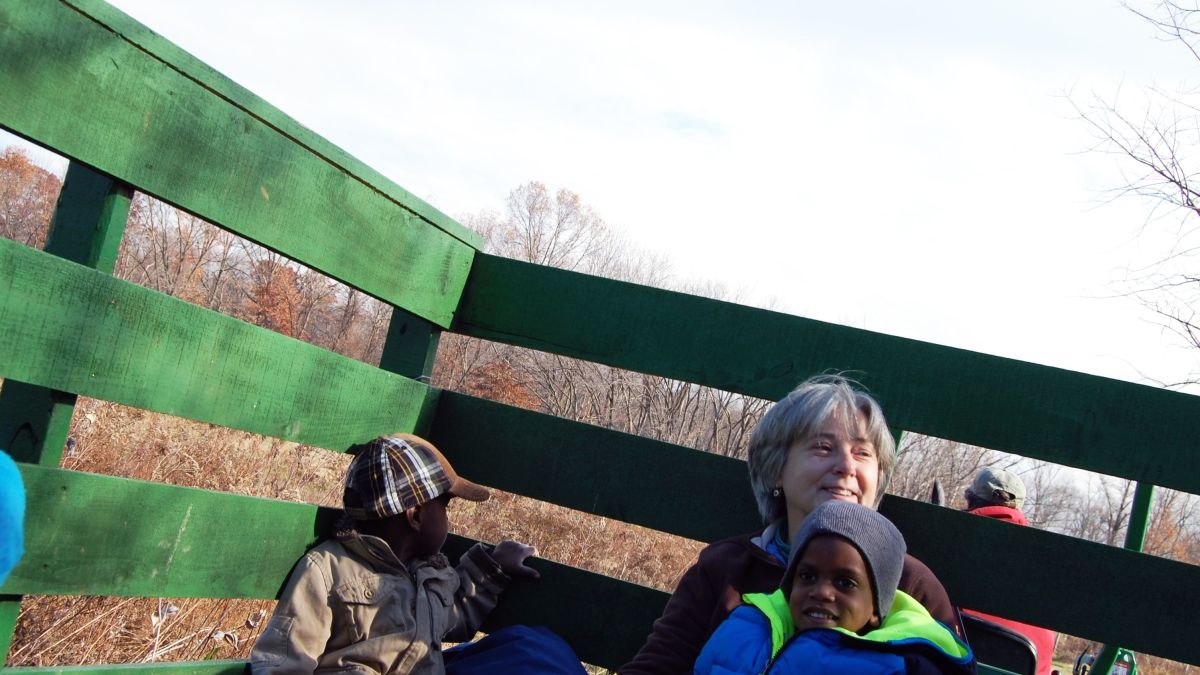
Photo by The Nature Preschool at Irvine Nature Center
The Ark Preschool in Baltimore offers parents in crisis with an option. While Head Start accommodates many low-income children, their programs are run on a traditional school year, and spaces fill quickly. Homelessness, on the other hand, can affect families at any time, and often without warning. So, often, students who become homeless also miss the opportunity to attend preschool.
The Ark Preschool offers specialized services for families in crisis, allowing students to enroll at any time of the year, and letting them stay as long as they need to, until their parents get back on their feet and into a stable situation. Students stay at the school from a matter of days to several months. Occasionally, they stay through most of the school year.
A Lucky Meeting
Outside of Baltimore in Irvine, Maryland, the Irvine Nature Center operates the Irvine Nature Preschool. It's a beautiful, Earth-friendly facility set on 600 acres of woodlands, meadows, streams, and more. The property teams with wildlife, including preschoolers who roam the trails with their teachers on a daily basis. Like any other preschool, the Irvine Nature Preschool helps prepare its students for kindergarten, and is a fully licensed facility. Unlike most other preschools, the center also encourages students to explore outdoors every day, rain or shine.
It's the sort of preschool many parents might long for their children to attend, and one that is out of reach for every student at the Ark Preschool. But because of a mutual connection at a private school in Maryland whose students volunteer at both the nature center and the Ark Preschool, the two schools learned about each other last year. "It was one of those lucky things that happen," says Newman of the Ark Preschool. The two schools secured a modest grant to fund a partnership that would allow Ark students to visit the nature center.
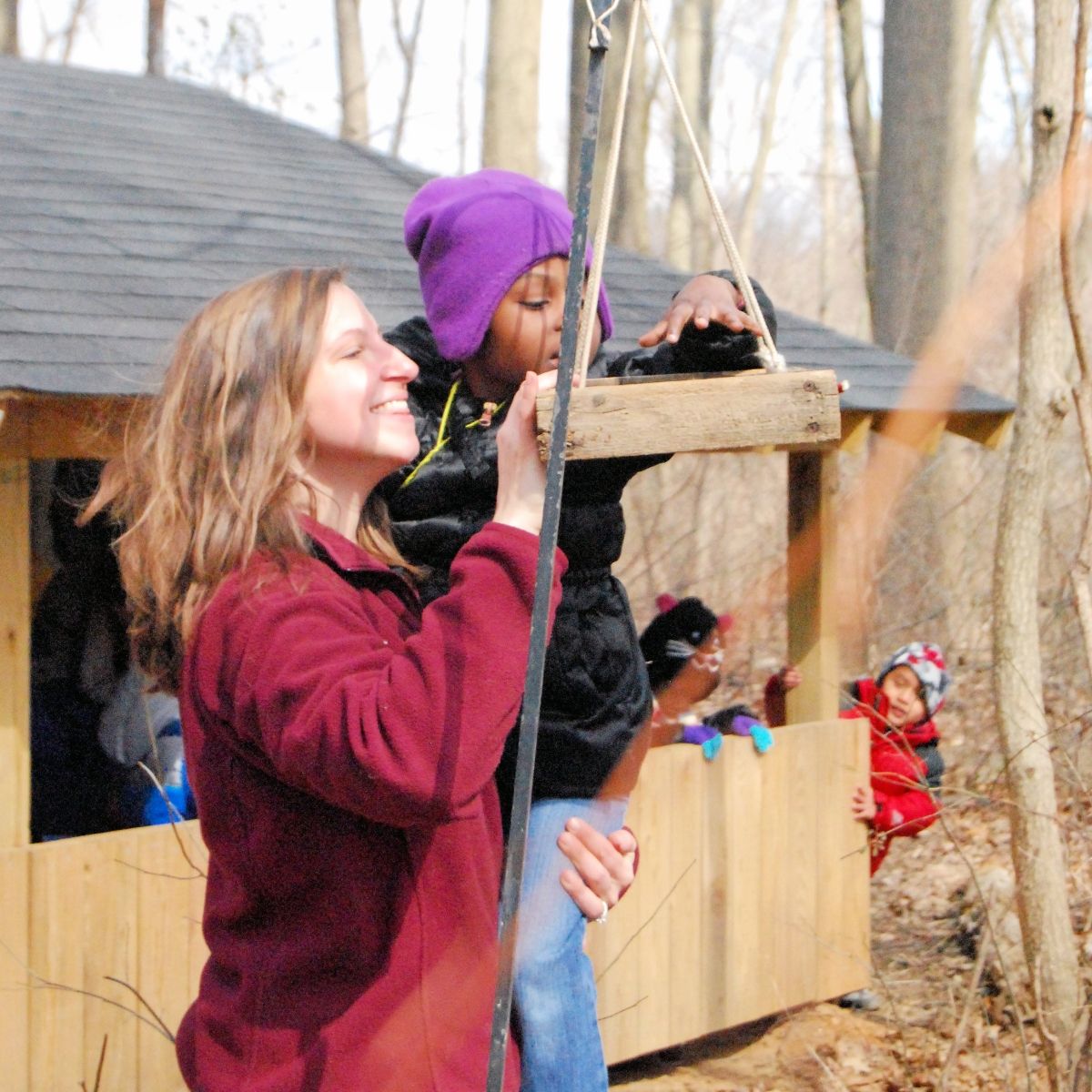
Photo by The Nature Preschool at Irvine Nature Center
The question of who is the "lucky" one in this partnership is open for debate. In the partnership, students from the Ark preschool visit the nature center once a month throughout the school year. The visits begin in the fall, continue through the winter, and conclude in the spring. The second year of visits started this fall. Throughout the program's first year, reflects the director of the Irvine Nature Preschool, Monica Weidel-Lubinski, "The [nature center] staff grew and changed just as much as the kids."
Parents are invited to come along, too. The Ark staff takes the "scenic route" on their bus ride to Irvine, so that the kids and their parents can see farmlands, horses, and barns along the way. For children who grow up in cities—homeless or not—farms and meadows are often a whole new experience. For kids with language delays, there often aren't words for what they see. Newman laughs about a student who exclaimed about the "horse houses" she saw out of the window of the bus when she saw a barn for the first time.
Weidel-Lubinski remembers her first day with the Ark preschoolers. Not sure if they'd feel comfortable heading straight out onto the trails, she instead began indoors, spreading a blanket out in the classroom and scattering it with leaves she'd picked up outside. She picked up one of the leaves and, "I asked them, 'What is this?' Where did it come from?" She says, "They thought and they looked. One girl said 'It's a flower.' None of the kids offered the word 'leaf.'" Weidel-Lubinski says the conversation put their partnership into perspective for her. "It made me realize how important [the experience of coming to the nature center would be] for them."
Visits to the nature center typically involve an interaction with one of the center's resident live animals, or with a taxidermy specimen. Then the group heads together onto the trails to learn more about the animal they've already seen, and to just experience nature. Weidel-Lubinski explains that "We always have themes, but of course we're open to other things that nature is offering that day." The students, teachers, and parents are free to explore the trails, climb on fallen logs, search for insects, listen to the nature sounds, lay in the grass, and more.
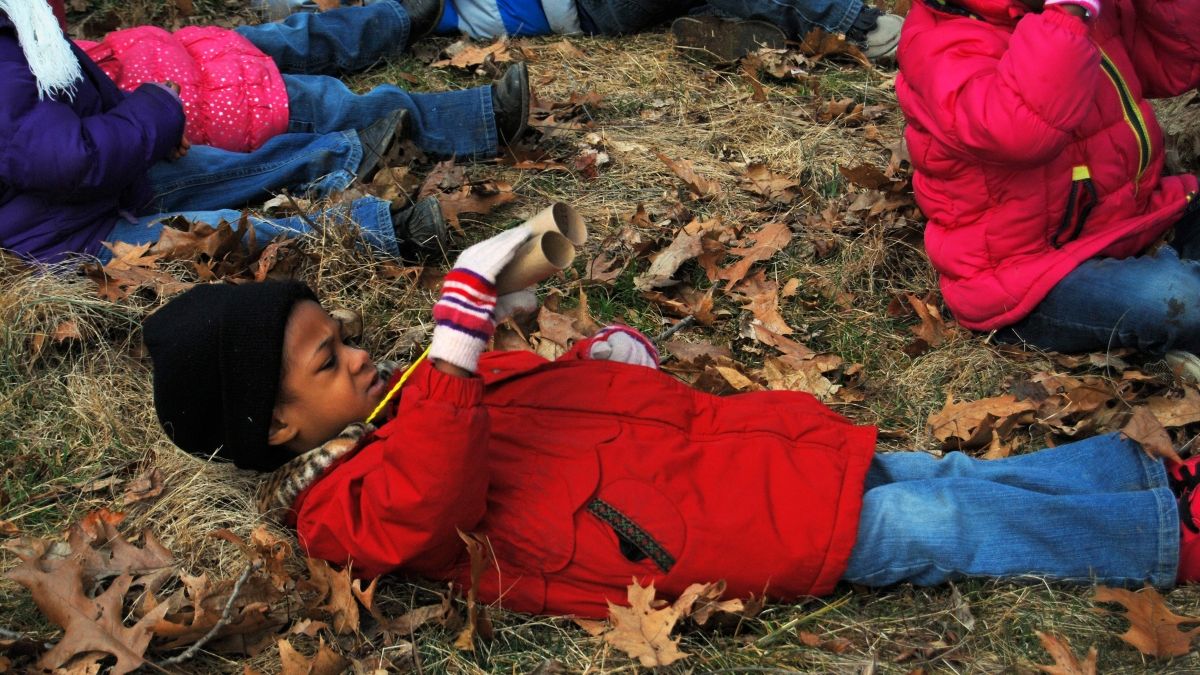
Photo by The Nature Preschool at Irvine Nature Center
"For kids who are experiencing the stressful lives that our kids are, being in nature can be a pacifying experience," says Newman.
Not only can the experiences help calm children in stressful situations, it can also excite and inspire. Weidel-Lubinski remembers one student, in particular, who was at the Ark school longer than most students, allowing him the opportunity to visit Irvine more than most other students. Jordan's* situation was particularly difficult because he had significant language delays and was prone to angry outbursts in the classroom. But he truly enjoyed his time at the nature center, and over the course of the school year, Ark teachers, special education teachers, and others all worked together to help Jordan catch up to his peers. By the end of the year, Jordan's improvement was remarkable.
And his progress was on display during his last visit to the nature center, when Weidel-Lubinski asked for his help in the outdoor classroom. She needed to fill the rain barrel, and asked Jordan if he could get some of the other kids to help. She stood amazed and gratified as Jordan, who had been so angry and incommunicative at the beginning of the year, gathered other children to help and explained how to fill the rain barrel. He patiently worked with the other children in ways that were not at all possible at the beginning of the year. Jordan's teachers still tear up when they think about his incredible transformation, and they credit his experiences at the nature center, which he particularly enjoyed, for some of his progress.
Extending the Experience
Weidel-Lubinski thinks about kids in urban schools, who rarely experience wild nature. And she thinks about students in high-pressure schools that are focused on test results, constantly drilling the children and leaving little time for free play and exploration. These schools might fit in a field trip to the center during the year, but, she concedes, "I question sometimes how valuable a one-time visit is." If a child comes to the center just once, how much impact can it really have on his or her life? Weidel-Lubinski thinks longer-term relationships like the one Irvine has with the Ark Preschool is better. "I feel like this is the way to do it."
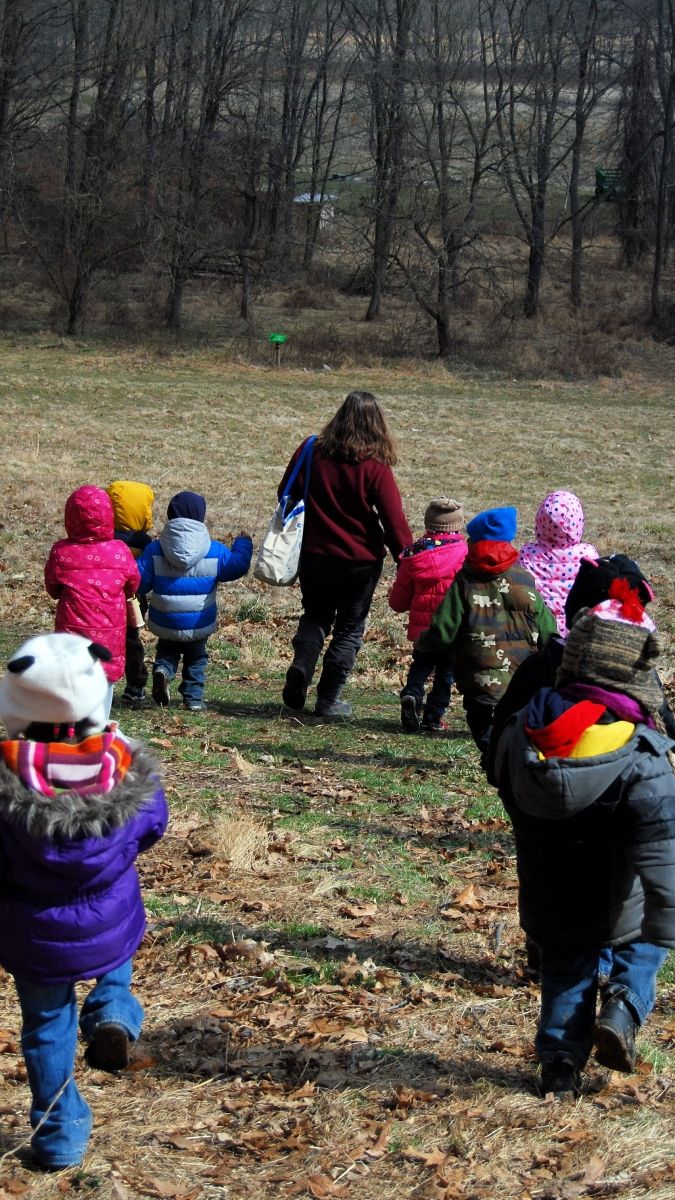
Photo by The Nature Preschool at Irvine Nature Center
And, she says, these kinds of partnerships shouldn't feel out of reach because of money. "It's not an astronomical cost," she says. "I think it's a very fundable kind of project." Certainly, it's worth exploring. And the experience is not just valuable for the students, who can observe changes over time when they visit repeatedly. Teachers can also learn from the center's naturalists, who model teaching about nature so that the teachers can do more on their own in between visits.
For her part, the Ark's Newman hopes that the visits spark an interest in her students and their families in getting outside more often. "Even in an urban setting, you can learn to see nature and experience nature." Children can check out the insects on the sidewalk while they wait for the city bus. Parents can help them count birds on the power line and listen for their songs. "There is nature around all of us wherever we are," she explains. And, a Baltimore resident herself, Newman notes that the city is filled with beautiful parks that are easy for most residents to access, and are simply waiting for her students and their families to visit them.
She hopes the partnership with the Irvine Nature Center has opened up opportunities to her students and their families that they otherwise would never have had. And she hopes that it also has helped more people see the face of homelessness. It's not the face most people have in mind, she says. "The face of homelessness is cute little three and four year olds." According to Newman, partnerships like the one she and Weidel-Lubinski have developed are an important step in ending homelessness. "There shouldn't be homelessness," she says. "But we're not going to get there for a while, so in the meantime, we need these kinds of relationships."
Learn More
If you would like to discover more ways to connect early learners with nature, visit the Irvine Nature Center for the third annual Nature Preschool Conference, June 6-8, 2014.
To learn more about the Ark Preschool, visit their site.
And to learn more about education for homeless children, visit the National Association for the Education of Homeless Children and Youth. The Association holds its annual conference in November.
* Name changed to protect privacy.